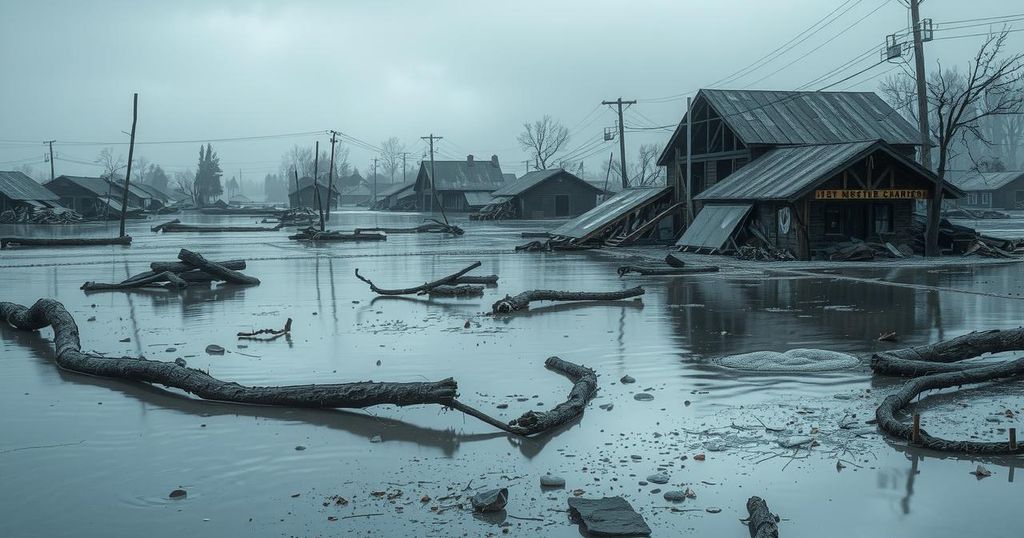President Cyril Ramaphosa Visits Flood-Affected Areas in Eastern Cape, Death Toll Reaches 78
President Cyril Ramaphosa visited flood-impacted areas in Eastern Cape, South Africa, where at least 78 people have died due to severe flooding. Rescue efforts began late due to resource shortages, prompting criticism of the government’s response. As floodwaters recede, authorities expect the death toll to rise, emphasizing the need for community support in reporting missing individuals.
CAPE TOWN, South Africa — President Cyril Ramaphosa made a visit to the southeastern region struck by devastating floods that have claimed at least 78 lives. The president’s tour took him to Mthatha in the Eastern Cape, where the floods first started battering communities early Tuesday. Rescue operations have continued for four days, amid concerns that the death toll will rise further.
During his visit, President Ramaphosa was briefed by officials from the National Disaster Management Center, as he toured a bridge where a school bus was taken by the violent waters. The tragedy of the bus incident includes the confirmed loss of six students, the driver, and one additional adult, while at least four children remain missing.
Questions have arisen regarding the speed and effectiveness of the response by authorities to the disaster, which originated from an extreme weather front that brought heavy rainfall, fierce winds, and even snow to the province. The severity of the situation was forecasted last week, yet issues with resource allocation hampered initial rescue efforts, according to officials.
“The rescue effort was paralyzed,” said Eastern Cape Premier Oscar Mabuyane, referring to the lack of specialized teams and equipment in one of the nation’s poorest areas. The province is home to approximately 7.2 million people, yet it has only a single official rescue helicopter, which had to be flown in from over 500 kilometers away.
In response to the rescue criticism, President Ramaphosa expressed sadness over the deaths but mentioned that without early interventions, the loss could have been even greater. Many of those swept away by the floods were caught by surprise as they slept. Reports indicate that victims were taken along with parts of their belongings when flash floods hit in the early morning hours.
As search efforts continue, rescues are becoming more hopeful; floodwaters are retreating. Officials predict further bodies may be recovered as teams scour the remaining flooded areas and search through wrecked homes. The number of children reportedly among the deceased has deeply saddened the community.
“I need psychological help because I saw people dying in front of me,” recounted Mthatha resident Zinathi Vuso. She described harrowing scenes of people clinging to debris only to be swept away. “That is why you are seeing people still getting recovered and others are yet to be found.”
Search teams have discovered bodies as far as two kilometers away from the locations where victims were last seen during the flooding. Authorities are urging the public to report any missing individuals to facilitate the search. Cooperative Governance Minister Velenkosini Hlabisa, who is leading government efforts, acknowledged the severity of the crisis, stating, “We are in a crisis. A real disaster.”
Coastal regions in South Africa frequently face risks associated with extreme weather events following patterns from the Indian Ocean and Southern Ocean. In fact, last year’s flooding in and around Durban resulted in over 400 deaths. The poor and informal housing communities around the rivers were hardest hit by this week’s flooding, officials confirmed.
The recent floods in Eastern Cape province illustrate the devastating impact of extreme weather, leading to at least 78 confirmed deaths and raising significant concerns about emergency response efficiency. The region’s challenges in resource allocation for rescue operations have drawn criticism as recovery efforts continue. As authorities and residents grapple with the unfolding crisis, efforts are underway to locate the missing and provide support to affected communities.
Original Source: www.wral.com




Post Comment